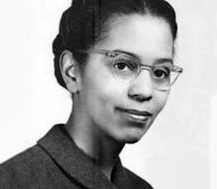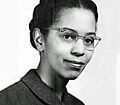Willa Beatrice Player facts for kids
Quick facts for kids
Willa Beatrice Player
|
|
|---|---|
 |
|
| Born | September 9, 1909 Jackson, Mississippi, United States
|
| Died | August 29, 2003 (aged 93) Greensboro, North Carolina, United States
|
| Occupation | Educator, college president, civil rights activist |
| Parent(s) | Clarence C. Day Beatrice Player |
| Relatives | Edith Player Brown (sister) Linda Beatrice Brown (niece) |
Willa Beatrice Player (born August 9, 1909 – died August 29, 2003) was an important American educator and leader. She was also a strong supporter of civil rights for all people. Willa Player made history as the first African-American woman to become president of a four-year college that was fully recognized for its quality. This happened when she became the president of Bennett College in Greensboro, North Carolina.
During her time at Bennett College, she started as a teacher. Then, she took on more and more important leadership roles. From 1955 to 1966, Dr. Player was the president of this historically black college. This was a time when the Civil Rights Movement was very active in the Southern United States. She bravely supported Bennett students who took part in the Greensboro sit-ins. These long protests helped to end segregation at lunch counters in stores downtown.
Willa Player had an excellent education. She earned her first degree from Ohio Wesleyan University. She then got a Master's degree from Oberlin College. She also studied in France at the University of Grenoble and earned a special certificate. Later, she completed her PhD from Columbia University. After leaving Bennett College in 1966, President Lyndon B. Johnson chose her for a big job. She became the first female Director of College Support in the U.S. Department of Health, Education and Welfare. She worked there until 1986.
Contents
Early Life and Education
Willa Player was the youngest of three children. She was born in Jackson, Mississippi, in 1909. When she was eight years old, in 1917, her family moved to Akron, Ohio. This move was part of the Great Migration. During this time, many African Americans moved from the South to northern cities. They were looking for better jobs and chances for education.
Willa grew up in a religious family and was very active in the Methodist church. As a teenager, she spent many hours singing in the youth choir. This helped her get ready for college. In 1925, she graduated from West High School in Akron. She was then accepted into Ohio Wesleyan University, which was a Methodist university.
She was one of only three African-American students accepted there that year. At that time, they were not allowed to live in the dorms on campus. Willa graduated in 1929, along with her sister, Edith Player Brown, who became a musician. In 1930, Willa Player earned her master's degree from Oberlin College.
Teaching and Studies Abroad
In the fall of 1930, when she was 21, Willa Player began teaching at Bennett College. This college in Greensboro, North Carolina, was a historically black college connected to the United Methodist church. It had started in 1873 to train teachers, but by 1926, it had become a college just for women. Willa taught Latin and French there.
After teaching for a few years, Player took time off to continue her own studies. She went to the University of Grenoble in France. In 1935, she earned a special certificate called a Certificat d'Études.
Becoming a College Leader
After her studies in France, Willa Player returned to Bennett College. She was chosen to be the Director of Admissions and also served as the Acting Dean. In 1937, a student named Frances Jones led a civil rights protest in Greensboro. Frances was the daughter of the college president, David Dallas Jones. Player and R. Nathaniel Dett helped advise Frances as she led a boycott against segregated movie theaters. These theaters showed movies that had racist ideas.
Player left Bennett College again to earn her Ph.D. She received it from Columbia University in 1948. Later, she did more advanced studies at the University of Chicago and the University of Wisconsin. When she came back to Bennett, she was promoted to Coordinator of Instruction. In 1952, she became the Vice-President of Bennett College. The magazine Jet reported that she was offered the presidency of Spelman College that year, but she chose to stay at Bennett.
In 1955, Willa Player became the acting president of Bennett College. The president, David Dallas Jones, was sick with cancer. He knew he couldn't do his job, so he suggested Player to the college's board of trustees. In the fall of 1956, Willa Player officially became the president of Bennett College. She was the first African-American woman to lead a recognized four-year college. In 1957, Player helped the college get important accreditation from the Southern Association of Colleges and Schools (SACS). This meant the college met high standards for education.
Supporting Civil Rights
After World War II, many groups worked harder to achieve racial justice. They wanted to make sure all people had their constitutional rights, like using public places and voting in the South. For many years, most Black people in North Carolina and other southern states had been prevented from voting by unfair laws. This work for change often met with strong resistance from those who wanted to keep the Jim Crow system of segregation.
Rev. Martin Luther King Jr., a leader of the Montgomery Bus Boycott and a founder of the Southern Christian Leadership Conference, was invited to Greensboro in February 1958. Local Black clergy and the NAACP invited him. However, some local churches and colleges were worried about hosting him. When Willa Player was asked, she said: "Bennett College is a liberal arts college where 'freedom rings,' so King can speak here."
On February 11, 1958, King spoke to a huge crowd at Annie Merner Pfeiffer Chapel at Bennett. Willa Player encouraged the young women at Bennett College to act on their beliefs for civil rights. She supported them when they planned sit-ins to integrate lunch counters. She held meetings with teachers and staff to help them understand the protests. She even arranged for students who were in jail to get their schoolwork so they wouldn't fall behind.
Later Career and Service
In 1962, Willa Player was named President of the National Association of Schools and Colleges of the Methodist Church. She was also the first African American person to serve on the board of trustees for Ohio Wesleyan University, her old college. After 36 years of working at Bennett College, Willa Player stepped down as president in 1966.
That same year, President Lyndon B. Johnson appointed her to a new role. She became the first female Director of the Division of College Support in the U.S. Department of Health, Education and Welfare. She held this important position until she retired in 1986.
Important Sayings
Willa B. Player was known for her wise words. Here are some of her quotes:
- "The black woman is expected to be a superwoman without acting like one."
- About the Bennett students' 1960 protest: "We don't teach our students what to think. We teach how to think. If I have to give exams in jail, that's what I'll do."
- About her time as president at Bennett College: "All I was thinking was I had a job to do."
Death and Recognition
Willa Player passed away on August 29, 2003, in Greensboro.
She received many honors during her life:
- A special teaching position, called a Mott Endowed Chair, was created in her honor at Bennett College.
- She received several honorary doctorates (special degrees given to honor achievements) from different universities:
- Doctor of Laws, Ohio Wesleyan University (1953)
- Doctor of Laws, Lycoming College (1962)
- Doctor of Laws, Morehouse College (1963)
- Doctor of Laws, Albion College (1963)
- Doctor of Humane Letters, Keuka College (1967)
- Doctor of Humane Letter, University of North Carolina at Greensboro (1969)
- Doctor of Public Service, Prairie View A & M University (1971)
Images for kids
 | Precious Adams |
 | Lauren Anderson |
 | Janet Collins |


